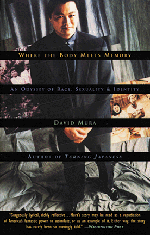GOLDSEA | ASIAN BOOKVIEW | MEMOIRS
Where the Body Meets Memoryby David Mura
Anchor New York, 1997, 2725pp, $14.95 (Paperback)
Candid self-examination by Japanese American Minneapolis author and award-winning poet
REVIEW: Lust and Remembrance
 hat is sexual attraction?" asks Japanese American author David Mura. "How is it formed?" Where the Body Meets Memory is Mura's seriously hilarious effort at answering those questions candidly and exhaustively from his own intimate experiences. Sexual confessions are commonplace enough and most of us would probably rather read an economic treatise. Mura's book demands exception. For one thing, the man's candor is inhuman. The intimate, often morbidly embarrassing feelings and incidents--premarital, marital and extramarital--which he spills in mind-bogglingly evocative detail would instantly destroy most marriages. Mura's confessions are also fascinating because his far-ranging scrutity--simultaneously clinical and lyrical--of the fears and impulses that figured in the creation and building of his relationship with his caucasian wife is as efficient a way as any to dissect the core identity issues that torment most Asian Americans, particuarly males. The book is a fun, economical alternative to financing your own psychotherapy regime.
hat is sexual attraction?" asks Japanese American author David Mura. "How is it formed?" Where the Body Meets Memory is Mura's seriously hilarious effort at answering those questions candidly and exhaustively from his own intimate experiences. Sexual confessions are commonplace enough and most of us would probably rather read an economic treatise. Mura's book demands exception. For one thing, the man's candor is inhuman. The intimate, often morbidly embarrassing feelings and incidents--premarital, marital and extramarital--which he spills in mind-bogglingly evocative detail would instantly destroy most marriages. Mura's confessions are also fascinating because his far-ranging scrutity--simultaneously clinical and lyrical--of the fears and impulses that figured in the creation and building of his relationship with his caucasian wife is as efficient a way as any to dissect the core identity issues that torment most Asian Americans, particuarly males. The book is a fun, economical alternative to financing your own psychotherapy regime.
EXERPT:
 ll my life I was on a leash
The problem was this: From the onset of my sexuality, I stumbled into experience after experience which pointed to my difference. At some level of consciousness, I was aware of racial differences in standards of beauty, that my sexual desires were crossing racial lines. Yet I had no one to talk with about this, nor any language to describe it, even to myself. Since I was so desperate to deny my racial identity, I never sought to break out of this zone of silence, to become more conscious of how race or ethnicity affected my life and my desires.
ll my life I was on a leash
The problem was this: From the onset of my sexuality, I stumbled into experience after experience which pointed to my difference. At some level of consciousness, I was aware of racial differences in standards of beauty, that my sexual desires were crossing racial lines. Yet I had no one to talk with about this, nor any language to describe it, even to myself. Since I was so desperate to deny my racial identity, I never sought to break out of this zone of silence, to become more conscious of how race or ethnicity affected my life and my desires.

Instead, I pressed harder to prove my uniqueness, my difference from other Asian Americans. I wanted to star in football and basketball, wanted to make it in the glamour sports, not in fencing or golf, where the few Asian American athletes played. Rather than dress like a science geek nerd, I was one of the first jocks to sport bell-bottoms, trying deftly to stride the line between a manly All-American athleticism and the incipient sixties Aquarian sensibility (my father did put the kibosh on moccasins--"No son of mine is going to look like a hippie"--he'd worked too hard becoming part of Middle America to have me throw it all away). I ran for student council, class president, and though I was always defeated, I refused to sink back into the anonymity that characterized the handful of Asian Americans at my school. As in my pursuit of athletics, where I only managed to make the varsity basketball team as a third stringer, my reach always exceeded by grasp. Of course, I would go on to the Ivy League, and then an Ivy League law school, and by Ivy League, I meant Harvard, Yale, or Princeton.
From the start, there was something overblown in my ego and my attraction to status, to placing myself ahead of the pack, a striving and an overstriving that was bound for a fall. Perhaps this is what my mother meant in her frequent comment to me during adolescence: "David, you think too much of yourself." Perhaps she wanted to protect me from the hubris that seemed inexorably tied to my own upwardly mobile strivings.
ASIAN AIR ISSUES FORUM |
CONTACT US
© 1999-2003 GoldSea
No part of the contents of this site may be reproduced without prior written permission.
